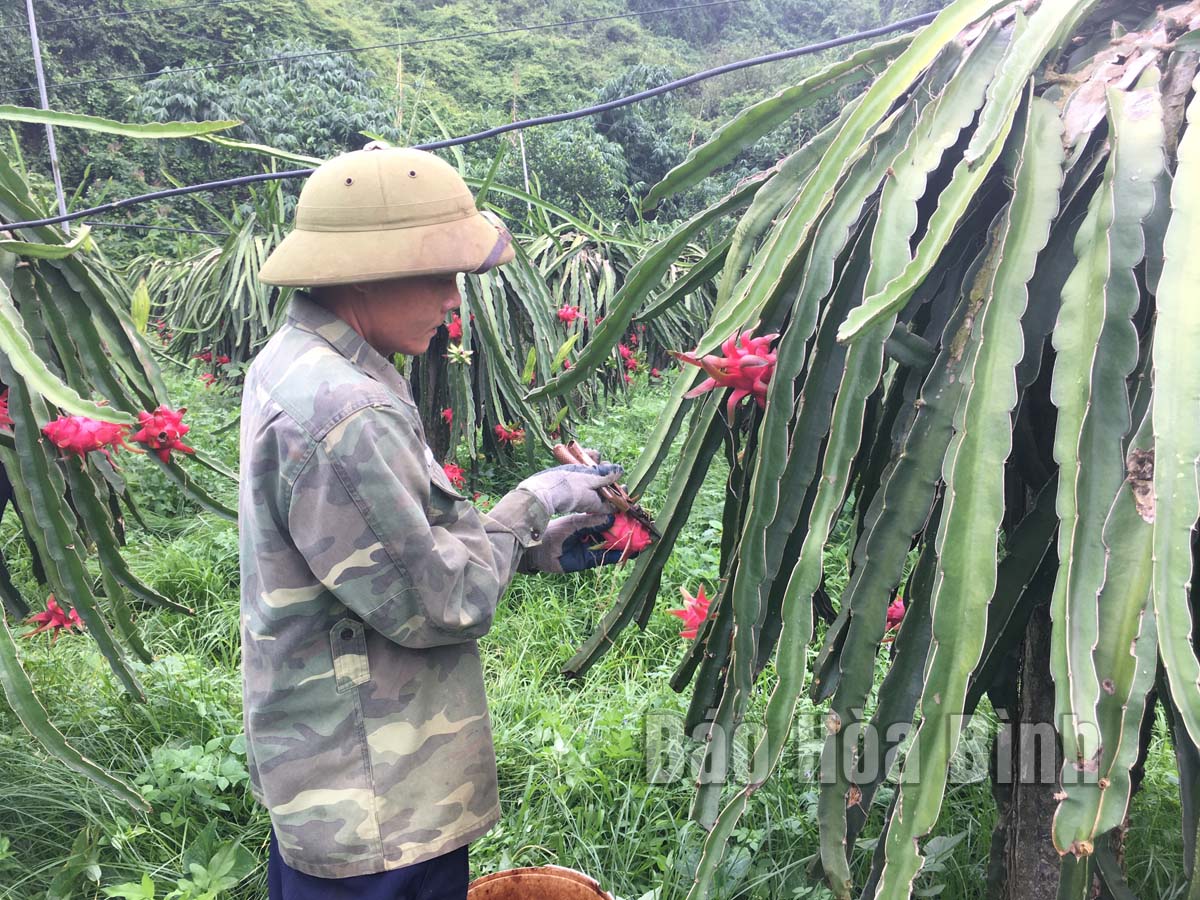
(HBO) – Red-flesh dragon fruit farming has become increasingly popular in Lac Thuy district over the last 10 years. The district now has nearly 56 hectares under the tree, mostly in Ba Hang Doi township and Phu Thanh commune. Productivity is estimated at 18 – 20 tonnes per hectare on average and output reaches 810 – 900 tonnes per year.

A farmer works on his red-flesh dragon fruit farm in Ba Hang Doi township, Lac Thuy.
Red-flesh dragon fruit produced by Thanh Hoa agricultural and service cooperative has been recognised as a three-star "One Commune, One Product” (OCOP) product of the province. It is among the six OCOP products of Lac Thuy made available on e-commerce platforms in an effort to gain broader market access for the district’s farm produce. The district is also planning to expand intensive-farming areas of the fruit.
Ba Hang Doi township alone is home to 26 hectares of red-flesh dragon fruit cultivated by 40 households on T-shaped frames, the latest farming technique, which have not only helped improve productivity but also cut labour costs and generate 4 – 5 crops per year.
However, the farming of the fruit in the district has yet to achieve sustainability as most of the farming areas are on a small scale and the district has not developed a large-scale production zone for the sector. Additionally, seedling quality still varies and application of advanced technology and disease control remain limited.
Head of the district’s division of agriculture and rural development Ngo Dinh Tam said Lac Thuy is seeking a certification for the trademark "Lac Thuy Dragon Fruit” which is expected to finalise this year. It has been raising growers’ awareness of Production Unit Code and Packing House Code, accelerating the granting of the codes, and strengthening the management of the granted codes, he said, adding that these factors are crucial for local dragon fruit to enter foreign markets.
In the long term, the district needs to set sight on dried and juice products from the fruit in order to raise its values, he noted./.
Since the beginning of this year, under the direction of the Department of Agriculture and Environment, the Sub-Department of Agricultural, Forestry, and Fishery Product Quality Management has strengthened the integration of the professional activities to promote and guide the organizations and individuals in the production and trading of agricultural, forestry, and fishery products to comply with the legal regulations regarding the use of chemicals, pesticides and veterinary medicines in crop cultivation, livestock farming and aquaculture. They also provide guidance to processing and manufacturing establishments on keeping the records to trace the product origins and using food additives from the approved list according to the regulations.
Hoa Binh province saw a significant rise in state budget revenue in the first two months of 2025, heard a meeting chaired by Vice Chairman of the provincial People’s Committee Quach Tat Liem.
Ha Thi Ha Chi, a 26-year-old graduate in law, has taken an unconventional path by returning to her hometown in Mai Chau district to establish the Tong Dau Cooperative, creating stable jobs for local women and bringing Thai ethnic brocade weaving to the global market.
As the Lunar New Year 2025 approached, pork prices surged, creating a profitable season for farmers in Tan Vinh commune, Luong Son district. Taking advantage of the rising demand, Can Minh Son, a farmer from Coi hamlet, sold over 30 pigs at 69,000 VND/kg, each weighing more than 100 kg. After deducting expenses, his family earned a profit of over 50 million VND.
alternate member of the Central Party Committee, Secretary of the Hoa Binh provincial Party Committee Nguyen Phi Long on March 5 had a working session with Yan Jiehe, Founder and Chairman of the China Pacific Construction Group, one of China's largest private corporations in the field of transport infrastructure. Deputy Secretary of the provincial Party Committee, Chairman of the provincial People's Committee Bui Duc Hinh and leaders of provincial departments and sectors also attended the working session.
The electronic printed circuit board (PCB) manufacturing and processing plant of Japan’s Meiko Group, located at Da River Left Bank Industrial Park in Hoa Binh city with a total investment of over 200 million USD, is expected to create thousands of jobs and make a significant contribution to the local budget.



